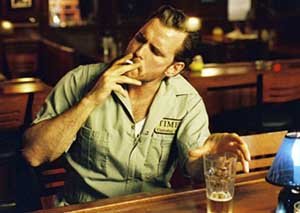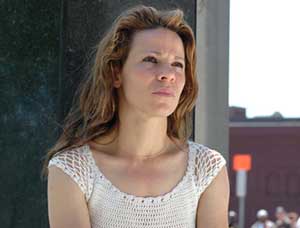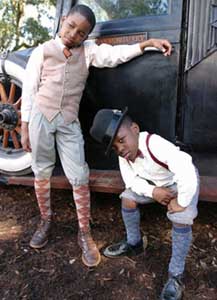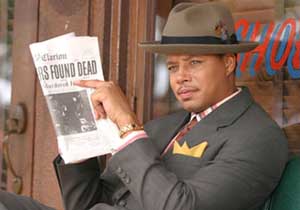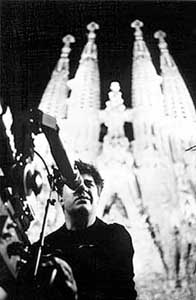-
- Alabama Democrats reinstate gay candidate for Legislature
- Domestic partners bill sparks personal attacks in California’s Assembly
- Transgender inmates push prison officials for sex-change surgery
- Randall Terry’s campaign tests ‘family values’
- Promising UW researcher leaving over domestic partner benefits
- Federal judge dismisses lawsuit over gay Episcopal priest battle
- National News Briefs
- World News Briefs
Arts & Entertainment
Out at the movies
Published Thursday, 31-Aug-2006 in issue 975
Factotum
Directed by Bent Hamer
Written by Bent Hamer and Jim Stark
Featuring: Matt Dillon, Lili Taylor, Marisa Tomei and Didier Flamand
94 minutes
Beat it, kids! It’s time that the grownups once again took control of the theater for this delightfully downbeat visit to Bukowskiland. Given the cinematic wringer we’ve been put through this summer, a vacation to the lower depths has never been more welcome, and with a director named Bent, you know it’s bound to be good!
Based on Charles Bukowski’s autobiographical novel, Matt Dillon plays Henry Chinaski, a booze-infested poet who spends the lion’s share of his day sweating 100 proof. A factotum is a worker hired to perform a variety of tasks. For Henry, the perfect job (and woman) must never get in the way of his writing and drinking. But the guy has spunk! Even when the chief taxi dispatcher sends him packing, Henry has the wherewithal to ask his boss to call him a cab.
Henry wanders the streets of Minnesota moving from one shit job to another. He connects with fellow alkie Jan (Lili Taylor, brilliant as always) and it isn’t long before the two are living together. In a voiceover narration that is frequently responsible for much of the film’s dark humor, Henry endearingly describes Jan as “an excellent fuck [who] had a tight pussy and took it like it was a knife that was killing her.”
I worship storytellers who in one summarizing moment distill everything you need to know about their characters’ present station in life. Henry and Jan break into cars not to steal them or pawn their contents but to check the ashtrays for half-smoked cigarette butts.
Me, You and Dupree proved that Dillon doesn’t have the makings of a broad physical comedian. Almost by way of apology, his deadpan delivery of Bukowski’s inner angst proves him more than capable of meeting the challenges presented by a restrained black comedy. My one complaint is that the conversational Henry comes off as a thick-tongued ape seemingly incapable of writing and delivering such articulate narration.
With the exception of an occasional lapse in judgment, Dillon has no apologies to make concerning his career choices. He may not be the first name that comes to mind when looking for someone to represent Charles Bukowski, and a Max Factor-induced rosacea blush doesn’t come close to ravaging his flawless features. It is the best performance of his career, infinitely stronger than the one that brought him an Oscar. He makes a much better Buk than Mickey Rourke’s over-the-top turn in Barfly, which was scripted by the master himself.
No one mentions the one Bukowski adaptation that leads the fetid pack: Marco Ferreri’s Tales of Ordinary Madness. I guarantee you will never forget the image of Ben Gazzara trying to literally re-enter an obese hooker’s womb ead first. It awaits you on DVD if Factotum finds you hungering for more.
My favorite Charles Addams cartoon depicts a movie theater packed with saddened, teary-eyed patrons. There in the center of the fr4ame sits a downright tickled Uncle Fester. For 90 minutes, I was pleaseingly festered.
Rating: 1/2
Idlewild
Written and directed by Bryan Barber
Featuring: Andre Benjamin, Big Boi, Paula Patton and Terrence Howard
90 minutes in CinemaScope
There was a period where you couldn’t turn on a TV set or walk through a mall without hearing Outkast’s “Hey Ya” blasting through the speakers. It didn’t take long before some savvy producer went idol-wild over lead singer Andre Benjamin by giving him a shot at feature-film stardom.
Set in a Prohibition-era speakeasy, Benjamin plays Percival, a timid piano player ultimately forced to choose between his career and a disapproving father (Ben Vereen). Instead of cloning Coppola’s Cotton Club, the film’s obvious inspiration, or one of the many versions of The Jazz Singer, music video director Bryan Barber presents us with a polyester blend more reminiscent in tone and temperament to Bugsy Malone, Alan Parker’s prepubescent gangster musical.
Better bring an umbrella, for this anachronistic downpour is bound to leave you drowning in clichés and its desperate need to gain attention by being hip and relevant. I am sure that the film’s few defenders will argue Barber was making a point by loading his period musical with contemporary hip-hop sounds, but whatever logic there was in that decision went soaring over my head. The movie’s one attempt to replicate a period tune falls flat because, frankly, Benjamin’s vocal skills are not up to the task. He excels at fragmenting lyrics, but when it comes to belting out a straightforward ballad toward the end he sounds like a Simon Cowell reject.
This reminded me too much of another wholly unwatchable musical, Chicago. Idlewild’s main mode of cinematic expression is rapid-fire editing as opposed to pacing, camera movement and visual style. While the energy level is high, you will have to look carefully to find shots of characters’ feet during the dance numbers.
The gangster suplot involving small-time crook Rooster (BigBoi) and big-time psychotic Trumpy (a wasted Terrence Howard) does little more than regurgitate the past. Can you believe this film actually has the audacity to place a bullet-stopping Bible in one of its carecter’s breast pockets? Paula Patton plays the romantic lead, and as an actress she makes a great runway model. Her inability to simultaneously walk and read dialogue brought about a few snarky chuckles.
The film does have one thing going for it. It guarantees us one, possibly two bathroom breaks during the Best Song performances during next year’s Oscars.
Rating: m
Confessions of a film snob and viva Pedro!
The new Ken calendar kicks off with an eight-film career retrospective of the works of Pedro Almodóvar. The films to be shown include brand new 35mm prints of Matador, Law of Desire, Women on the Verge of a Nervous Breakdown, The Flower of My Secret, Live Flesh, All About My Mother, Talk to Her and Bad Education.
Believe it or don’t, prior to my moving to San Diego seven years ago, I had never seen an Almodóvar film. Guilty, but with an excuse. Two former teaching colleagues for whom I had zero respect both approached me separately to tout Women on the Verge…. They made the fatal flaw of comparing Almodóvar’s work to that of my personal deity, Frank Tashlin. When asked which Tashlin films they admired most, both were hard pressed to come up with titles. I never expected these two stiffs to watch, let alone acknowledge films by a man responsible for many of the finest Warner Bros. cartoons in addition to first-rate comedies starring Bob Hope, Jerry Lewis and Jayne Mansfield.
Their ignorance was enough to fuel my ignorance, and I successfully sidestepped everything by Almodóvar. When asked about his films, I would joke that I had to save something for my deathbed. For six consecutive mornings last week, death came to this critic and it wasn’t as painful as feared.
Let’s instantly dispel the Tashlin nonsense. The similarities begin and end with an expressionistic use of color and a mastery of the CinemaScope frame. Tashlin was a supreme satirist, while Almodóvar’s main stock in trade is melodrama. With the exception of the hilarious opening of Law of Desire, which finds two middle-aged men dubbing the voices for a hot gay porno, I was surprised by Almodóvar’s overall lack of a sense of humor.
Not surprisingly, the two most talked about pictures in this series, Women on the Verge… and the Oscar-winning All About My Mother, were the most disappointing. At his worst, Almodóvar’s films fall apart due to coincidence and poorly structured third acts.
The jury has returned with a verdict. Of the eight films, three impressed me as cohesive works shorn of the shocks that helped establish the director as a semi-household name. His funniest film, Bad Education, is an outrageous story that embraces cinema while rigorously tackling the Catholic Church sex scandal.
The majority of the films in this collection center on career-driven women, and you wont find a better one that Flower of My Secret. In almodovar’s most mature film, Marisa Paredes hands in a stunning performance as a popular writer of romance novels hiding behind a pseudonym and a failed marriage.
My favorite of the bunch is Talk to Her, a love story in which the two female leads, a gored bullfighter and a ballet student, spend the majority of their screen time comatose and brain dead. This brilliant assault on people’s inability to communicate instantly warranted a second screening - I ran out and rented it later that same afternoon.
The era of home video has made it all but impossible to find theatrical reissues of career overviews. Why go to the theater when audiences can “book” living-room retrospectives? One regret: Neither the critic’s screenings nor the theatrical bookings are in chronological order, making the Almodóvar puzzle a bit more challenging to piece together.
|
|
Copyright © 2003-2025 Uptown Publications

